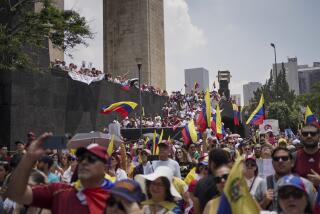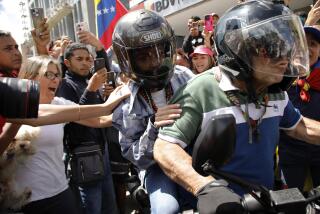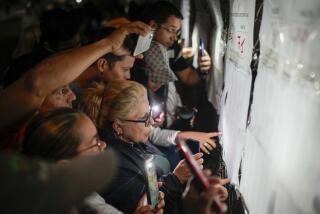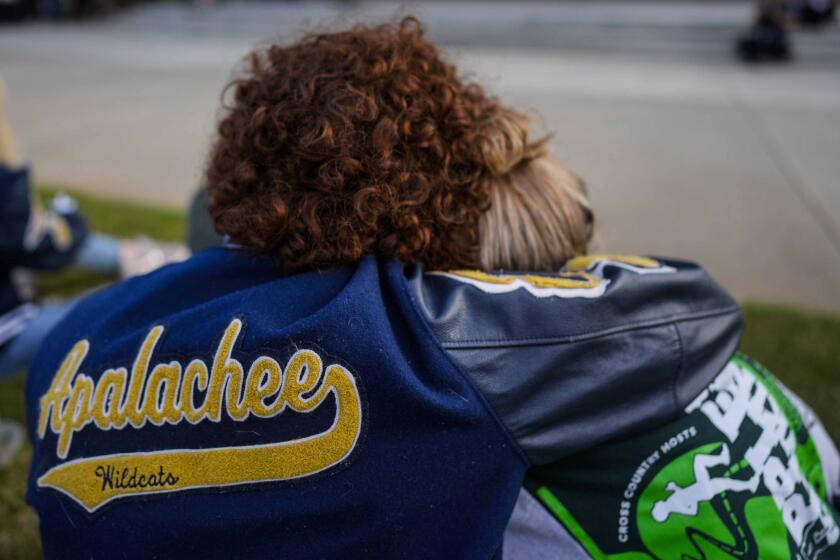Yeltsin Rally Ends Drive for Soviet Election
MOSCOW — Campaigning for the first contested national elections since the earliest years of the Soviet state ended here Saturday with an emotional rally for Boris N. Yeltsin, the radical populist whose anti-Establishment candidacy has symbolized the new willingness to break with political patterns.
More than 10,000 people filled a parking lot outside a riverside sports stadium to cheer Yeltsin, again demonstrating the widespread grass roots support he has won in Moscow with his attacks on privileges for government bureaucrats and Communist Party members.
Supreme Authority
Voters today will choose deputies to a newly strengthened national legislature that under President Mikhail S. Gorbachev’s political reforms is to exercise supreme authority.
The Communist Party has declared its intention to share power--but not forsake it--in order to pull the country out of its prolonged political, economic and social stagnation.
But the three-month-long campaign has released tremendous political energy, perhaps greater than was foreseen by party leaders, and this will play a greater role in shaping the country’s future than the results of the elections themselves.
“After this, things can never be the same again in our country,” Valery Savitsky, a pro-Yeltsin speaker at the three-hour rally and himself a candidate in the elections, told the crowd Saturday. “It would be very difficult for anyone to put the genie back into his bottle now.”
“Down with Special Privileges for the Bureaucrats!” said a placard carried by some in the crowd, and a banner declared, “Servants of the People Should Stand in Line with the People!”
Yeltsin, 58, who was ousted a year ago as a candidate member of the party’s ruling Politburo, restated his belief that an intense struggle against the Soviet government and party bureaucracy is the only way out of what he called a profound political and economic crisis.
“The way out of this crisis lies through radical democratization of the party and of society, through struggle against the party-bureaucratic apparatus, against corruption and social injustice,” Yeltsin wrote in the newspaper Moskovskaya Pravda, which had opposed his campaign and reluctantly published a letter in reply to its criticism of him.
But Yeltsin, the first tolerated opposition leader within the party since the 1920s, stayed away from his own rally--the fourth in just a week--for fear that his appearance might send his supporters into the streets of the Soviet capital and thus substantiate charges in official circles that he is a “rabble-rouser” and “irresponsible” in his appeals for mass support.
‘Yel-tsin, Yel-tsin!’
As enthusiastic supporters, most of them rhythmically chanting “Yel-tsin, Yel-tsin!” flooded into the sports stadium parking lot alongside the Moscow River, hundreds of policemen lined the roads, and even more soldiers waited as reinforcements in buses and trucks nearby. They clearly had orders to prevent any repetition of last week’s marches through the streets, but the rally was peaceful and participants dispersed quietly.
“What counts, comrades, is how many people we can take with us to the polls on Sunday, not how many we have numbered in the streets,” a pro-Yeltsin speaker told the rally. “The Americans have a humorous saying about their elections, ‘Vote early, vote often,’ and we should take its spirit of participatory democracy to heart.”
After six decades of uncontested elections in which the party decided everything in advance in order to produce rubber-stamp national and regional legislatures, these elections have been hotly contested in most areas.
Although only a single candidate is on today’s ballot in 384 of the 1,500 constituencies, the outcome in most of the others, where there are two, three and even six or seven candidates, is far from certain.
In the three Baltic republics of Estonia, Latvia and Lithuania, for example, candidates from strongly nationalist movements appear likely to win a majority of seats, and strong opposition showings are also likely in Armenia, Georgia, Byelorussia, Moldavia and even in the Ukraine, where the party machine forced many of its opponents to withdraw.
Green Candidates
In other areas, self-declared Green candidates, running on platforms calling for stronger measures to protect the environment, have emerged through the campaign as an important political force challenging the party’s development policies.
Although no group can match the Communist Party in organizational strength and ability to reach into every corner of society, the candidates who enjoy official party backing, such as Yeltsin’s opponent, Yevgeny Brakov, an automotive plant director, are running scared, frightened of losing by margins of 2 to 1, 3 to 1 and even worse as popular discontent is expressed at the ballot box.
And, although 82% of the 2,950 candidates are Communist Party members, the party’s policies and style of leadership emerged sharply as a major issue throughout the three-month campaign.
Imperfect as these elections may be, the poet Yevgeny Yevtushenko said at the Yeltsin rally, “they are a big step, indeed a leap, forward for us.”
“Most people here are working people,” Yevtushenko said, “and this is the first time we have a choice, even if it is a limited choice. What we are witnessing is history. We must make this start and move on to full, free elections.”
Humiliating Defeat Feared
Yeltsin could win the votes of as many as 5 million of the 6.5 million Muscovites eligible to vote, according to his campaign workers, who nevertheless fear a close contest as the city’s party bureaucracy attempts to avoid what will be a humiliating defeat if there were such a massive Yeltsin victory.
Nationwide, about 190 million of the country’s 285 million people are expected to vote at more than 180,000 precincts. Turnout is likely to approach 95% in most areas although voting is not obligatory. Everyone over 18 who has not been declared insane or deprived of his political rights is eligible to vote. Election officials said Saturday that steps have been taken everywhere to ensure the first secret ballot since the 1920s.
Voters will be electing 750 members for each of two houses of the new Congress of People’s Deputies--a total of 1,500. One house is being elected on the basis of one-person, one-vote constituencies, the other house on the basis of ethnic and territorial constituencies. In those districts where no candidate gets more than 50%, runoff elections will be held.
In addition, deputies have already been chosen for a third house from a variety of “public organizations,” ranging from the Communist Party, Communist Youth League and trade union federation to the Soviet Women’s Committee, Academy of Sciences and Union of Writers. Gorbachev was elected earlier this month as one of the party’s 100 deputies.
The Congress of People’s Deputies, whose three houses will have a combined total of 2,250 members, will elect about 450 of their number as members of the Supreme Soviet, a full-time legislative body whose chairman, certain to be Gorbachev, will be the country’s president. The congress itself will probably only meet briefly once or twice a year but retain “supreme power” under the constitution.
Some initial results, notably in Moscow, Leningrad, Kiev and other major cities, will be known late tonight, but a full picture is not expected until perhaps Tuesday, and complete results probably will not be known for a week.
More to Read
Sign up for Essential California
The most important California stories and recommendations in your inbox every morning.
You may occasionally receive promotional content from the Los Angeles Times.










